Ocean On The Moon Europa

Ocean on the moon Europa
Scientists' consensus is that a layer of liquid water exists beneath Europa's surface, and that heat from tidal flexing allows the subsurface ocean to remain liquid.

Europa's surface temperature averages about 110 K (−160 °C; −260 °F) at the equator and only 50 K (−220 °C; −370 °F) at the poles, keeping Europa's icy crust as hard as granite. The first hints of a subsurface ocean came from theoretical considerations of tidal heating (a consequence of Europa's slightly eccentric orbit and orbital resonance with the other Galilean moons). Galileo imaging team members argue for the existence of a subsurface ocean from analysis of Voyager and Galileo images.

The most dramatic example is "chaos terrain", a common feature on Europa's surface that some interpret as a region where the subsurface ocean has melted through the icy crust.
The thin-ice model suggests that Europa's ice shell may be only a few kilometers thick. However, most planetary scientists conclude that this model considers only those topmost layers of Europa's crust that behave elastically when affected by Jupiter's tides.

The Hubble Space Telescope acquired an image of Europa in 2012 that was interpreted to be a plume of water vapour erupting from near its south pole The image suggests the plume may be 200 km (120 mi) high, or more than 20 times the height of Mt. Everest.
Life?
So far, there is no evidence that life exists on Europa, but Europa has emerged as one of the most likely locations in the Solar System for potential habitability. Life could exist in its under-ice ocean, perhaps in an environment similar to Earth's deep-ocean hydrothermal vents. Even if Europa lacks volcanic hydrothermal activity, a 2016 NASA study found that Earth-like levels of hydrogen and oxygen could be produced through processes related to serpentinization and ice-derived oxidants, which do not directly involve volcanism.

In 2015, scientists announced that salt from a subsurface ocean may likely be coating some geological features on Europa, suggesting that the ocean is interacting with the seafloor. This may be important in determining if Europa could be habitable. The likely presence of liquid water in contact with Europa's rocky mantle has spurred calls to send a probe there.
Missions

Europa Clipper is an interplanetary mission in development by NASA comprising an orbiter. Set for a launch in October 2024, the spacecraft is being developed to study the Galilean moon Europa through a series of flybys while in orbit around Jupiter.

The Europa Lander is a proposed astrobiology mission concept by NASA to Europa, an icy moon of Jupiter. If funded and developed as a large strategic science mission, it would be launched in 2027 to complement the studies by the Europa Clipper orbiter mission and perform analyses on site. NASA's budget for fiscal year 2021 neither mandates nor allocates any funds to the mission leaving its future uncertain.
The objectives of the mission are to search for biosignatures at the subsurface ≈10 cm, to characterize the composition of non-ice near-subsurface material, and determine the proximity of liquid water and recently erupted material near the lander's location.
source
More Posts from Sergioballester-blog and Others

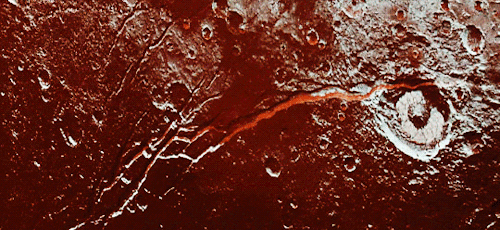
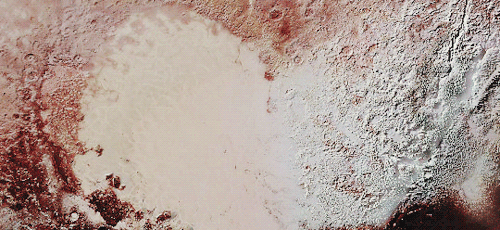
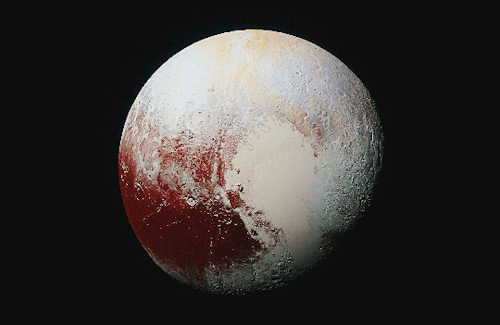
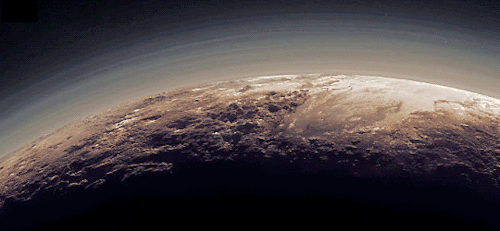
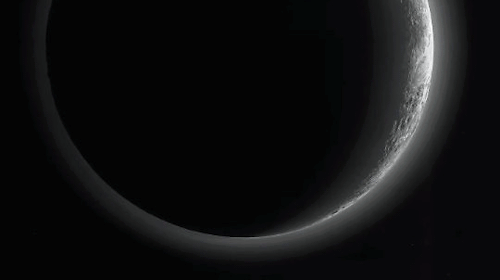
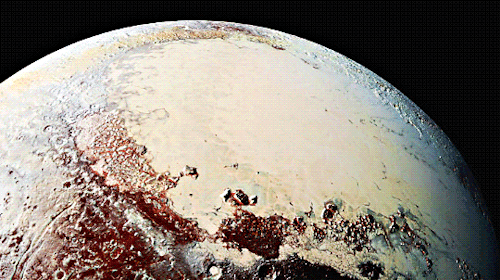


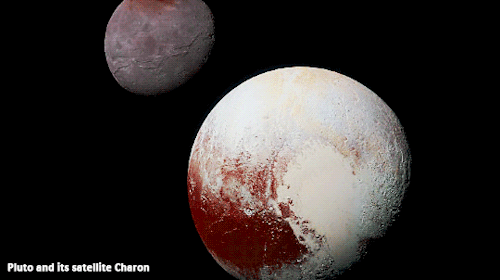
Pluto as seen from NASA’s New Horizons spacecraft ; Its heart-shaped sea is filled with poisonous ice.

Jupiter’s Racing Stripes by NASA’s Marshall Space Flight Center
One Step Closer to the Moon with the Artemis Program! 🌙

The past couple of weeks have been packed with milestones for our Artemis program — the program that will land the first woman and the next man on the Moon!

Artemis I will be an integrated, uncrewed test of the Orion spacecraft and Space Launch System (SLS) rocket before we send crewed flights to the Moon.

On March 2, 2021, we completed stacking the twin SLS solid rocket boosters for the Artemis I mission. Over several weeks, workers with NASA's Exploration Ground Systems used one of five massive cranes to place 10 booster segments and nose assemblies on the mobile launcher inside the Vehicle Assembly Building at the Kennedy Space Center (KSC) in Florida.
On March 18, 2021, we completed our Green Run hot fire test for the SLS core stage at Stennis Space Center in Mississippi. The core stage includes the flight computers, four RS-25 engines, and enormous propellant tanks that hold more than 700,000 gallons of super cold propellant. The test successfully ignited the core stage and produced 1.6 million pounds of thrust. The next time the core stage lights up will be when Artemis I launches on its mission to the Moon!

In coming days, engineers will examine the data and determine if the stage is ready to be refurbished, prepared for shipment, and delivered to KSC where it will be integrated with the twin solid rocket boosters and the other rocket elements.
We are a couple steps closer to landing boots on the Moon!
Make sure to follow us on Tumblr for your regular dose of space: http://nasa.tumblr.com
Wow

Image of Saturn taken by Cassini spacecraft in October 28, 2016.
Credit: NASA/JPL

The Moon with the ISS transitioning in front of it. Amazing view considering the ISS moves over and past it in a matter of seconds.

Sampling the ocean on Enceladus by europeanspaceagency
Grid fin hydraulic pump stalled, causing a soft water landing 🚀 POV shot.
Still most likely being reused in a CRS mission 🤘🏻

Blue Marble, Eastern Hemisphere March 2014 by NASA Goddard Photo and Video

July 20, 1969
Project Apollo on Flickr
-
 kvethashurtugal reblogged this · 4 months ago
kvethashurtugal reblogged this · 4 months ago -
 kvethashurtugal liked this · 4 months ago
kvethashurtugal liked this · 4 months ago -
 redflamesofpassion reblogged this · 11 months ago
redflamesofpassion reblogged this · 11 months ago -
 atlattacus liked this · 1 year ago
atlattacus liked this · 1 year ago -
 lovelyabstract reblogged this · 1 year ago
lovelyabstract reblogged this · 1 year ago -
 reptilepolice reblogged this · 1 year ago
reptilepolice reblogged this · 1 year ago -
 sanguineblue reblogged this · 1 year ago
sanguineblue reblogged this · 1 year ago -
 glaringmuffingossip liked this · 2 years ago
glaringmuffingossip liked this · 2 years ago -
 azaniacy reblogged this · 2 years ago
azaniacy reblogged this · 2 years ago -
 thenocturnalrush liked this · 2 years ago
thenocturnalrush liked this · 2 years ago -
 zaque-vynne liked this · 2 years ago
zaque-vynne liked this · 2 years ago -
 hellohellopostsnothing liked this · 2 years ago
hellohellopostsnothing liked this · 2 years ago -
 chalium liked this · 2 years ago
chalium liked this · 2 years ago -
 tiredghostpanda reblogged this · 2 years ago
tiredghostpanda reblogged this · 2 years ago -
 tiredghostpanda liked this · 2 years ago
tiredghostpanda liked this · 2 years ago -
 tahwan reblogged this · 2 years ago
tahwan reblogged this · 2 years ago -
 apileofbluestuff reblogged this · 2 years ago
apileofbluestuff reblogged this · 2 years ago -
 citruscrumples liked this · 2 years ago
citruscrumples liked this · 2 years ago -
 sciencestuffforme reblogged this · 2 years ago
sciencestuffforme reblogged this · 2 years ago -
 shirokona reblogged this · 2 years ago
shirokona reblogged this · 2 years ago -
 redlunarash liked this · 2 years ago
redlunarash liked this · 2 years ago -
 imrryr liked this · 2 years ago
imrryr liked this · 2 years ago -
 zurgsoftblog liked this · 2 years ago
zurgsoftblog liked this · 2 years ago -
 dash-n-step reblogged this · 2 years ago
dash-n-step reblogged this · 2 years ago -
 dash-n-step liked this · 2 years ago
dash-n-step liked this · 2 years ago -
 sasuke-shway liked this · 2 years ago
sasuke-shway liked this · 2 years ago -
 tresfoufou liked this · 2 years ago
tresfoufou liked this · 2 years ago -
 just-thinking-about-hogwarts liked this · 2 years ago
just-thinking-about-hogwarts liked this · 2 years ago -
 ventureexpedtion-1933 reblogged this · 2 years ago
ventureexpedtion-1933 reblogged this · 2 years ago -
 ventureexpedtion-1933 liked this · 2 years ago
ventureexpedtion-1933 liked this · 2 years ago -
 problematiquebitch liked this · 2 years ago
problematiquebitch liked this · 2 years ago -
 mellowmakermugpalace liked this · 2 years ago
mellowmakermugpalace liked this · 2 years ago -
 lavvenderskiies liked this · 2 years ago
lavvenderskiies liked this · 2 years ago -
 rothenburgkind liked this · 2 years ago
rothenburgkind liked this · 2 years ago -
 0rchidm4ntis liked this · 2 years ago
0rchidm4ntis liked this · 2 years ago -
 coloursunlimited liked this · 2 years ago
coloursunlimited liked this · 2 years ago -
 istillbelieveinmalebeauty reblogged this · 2 years ago
istillbelieveinmalebeauty reblogged this · 2 years ago -
 memezeek liked this · 3 years ago
memezeek liked this · 3 years ago -
 rochawentsad liked this · 3 years ago
rochawentsad liked this · 3 years ago -
 humdrum-sun liked this · 3 years ago
humdrum-sun liked this · 3 years ago -
 keendaanmaa liked this · 3 years ago
keendaanmaa liked this · 3 years ago -
 imjustexistingtbh reblogged this · 3 years ago
imjustexistingtbh reblogged this · 3 years ago